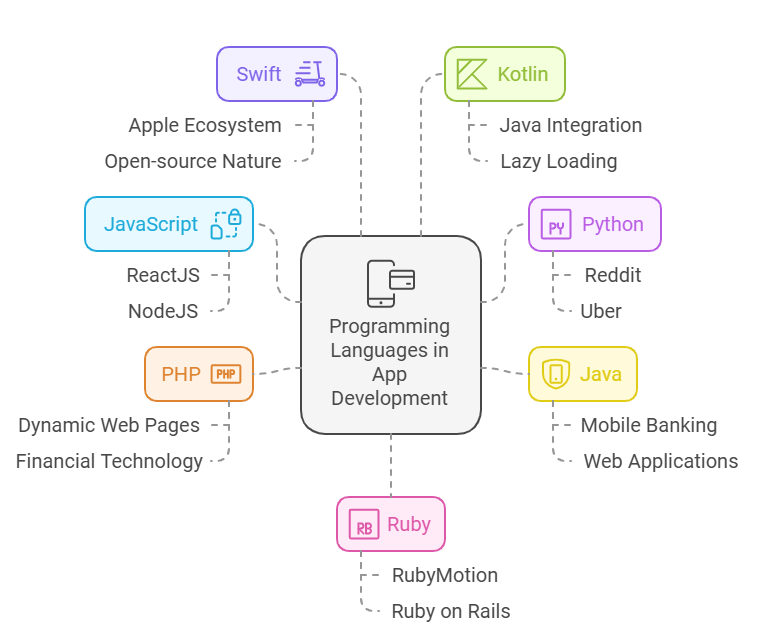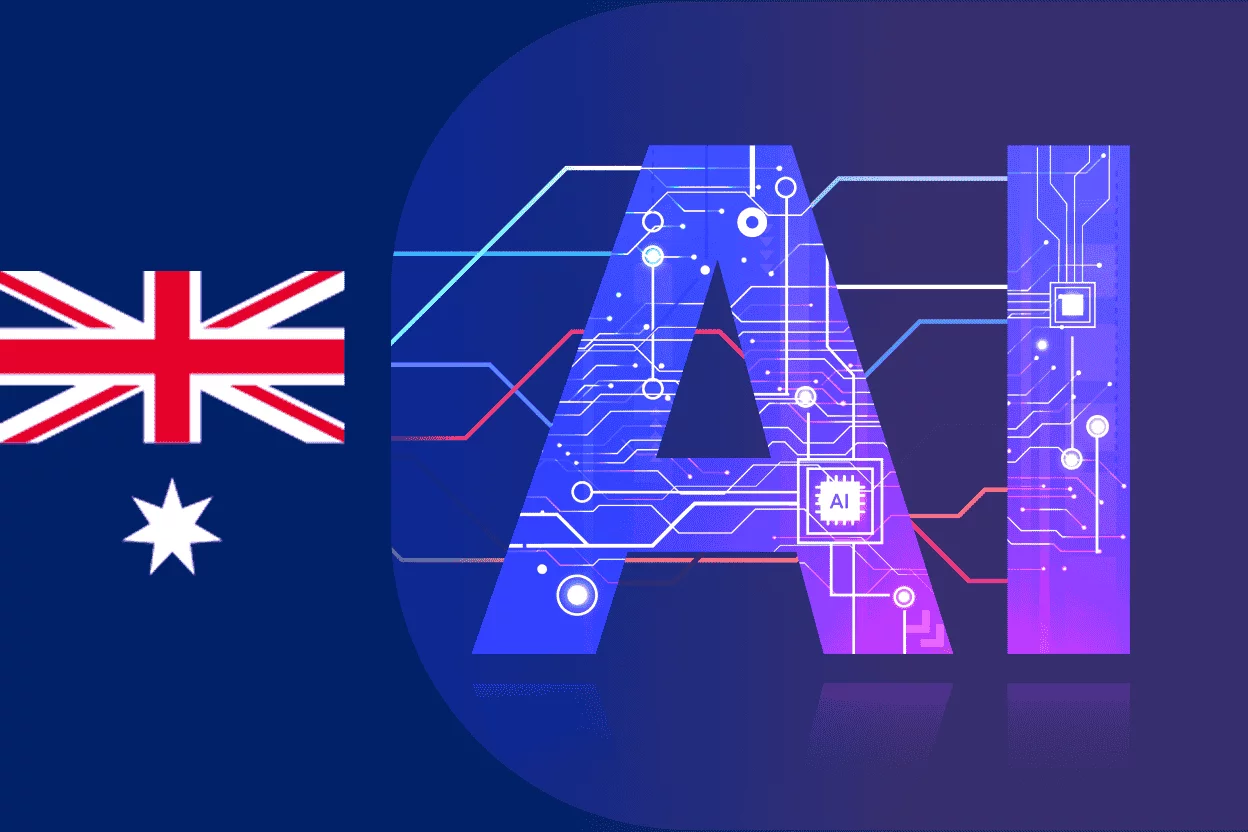Choosing the right programming language for app development project is a crucial business decision that demands careful technical evaluation and expertise. The language selected can greatly influence the project’s success, costs, development timeline, and future maintainability. Hence, Choosing the right programming language is as important as choosing the right app ideas for successful app development. Some of these languages are mainly used for commercial website development, while others are tailored for custom mobile app creation.
Certain languages, like .NET, are versatile and can be applied to develop software products across multiple platforms. So, which is the ideal language for app development? This article provides a thorough guide to assist you in making an informed decision by evaluating key factors and analyzing the pros and cons of widely used programming languages in app development, helping you discover the best coding language for app development based on your unique project needs.
Importance of Choosing the Best Coding Language for App Development
Selecting the right programming language for app development is like establishing the foundation of a building. The decision you make can either pave the way for success or create avoidable obstacles. Hence, choosing the right mobile app development company who can guide you well from their experience is equally important factors Before exploring the details, it’s important to grasp why this choice is so vital.
Why Programming Language Selection Matters
- Efficiency
Choosing the right language can optimize the development process, minimizing time and effort.
- Compatibility
Certain languages are better aligned with specific platforms, ensuring smoother integration.
- Scalability
A language’s ability to scale is crucial for long-term project success.
- Developer Expertise
The proficiency of your development team in a particular language plays a key role in project outcomes.
- Community Support
A widely adopted language benefits from a strong developer community, offering valuable resources and support.
Three Crucial Factors to Consider
When deciding on a programming language for your app development project, take the following aspects into consideration:
-
Project Requirements
When defining project requirements, it’s essential to consider several key aspects to ensure the success of your app. First, identify the core features and functionalities your app needs to deliver value to its users. This includes understanding the primary tasks the app should accomplish and any unique capabilities it should offer. Performance is another critical factor to assess whether speed and efficiency are essential to provide a seamless user experience, especially if the app is resource intensive.
Additionally, determine if the app will be designed for a specific operating system or if it needs to function across multiple platforms to reach a broader audience. Finally, consider integration requirements: will your app need to connect with other systems or utilize APIs to deliver its full potential? Addressing these elements during the planning phase ensures your app meets user expectations and functions smoothly within its intended environment.
-
Developer Expertise
When evaluating developer expertise for your project, it’s crucial to assess the technical skills of your team. Start by identifying the programming languages your developers are already proficient in, as this will shape the development process and determine which technologies are most accessible. Alternatively, if you’re looking to hire external developers, consider which specialized app development teams are available to support your project. The learning curve is another important consideration: are you and your team willing to invest the time and effort required to learn a new programming language?
Additionally, gauge the hiring market to ensure there is a sufficient pool of experienced developers fluent in your chosen language. This availability can be a deciding factor, as a limited talent pool could lead to increased costs and delays in project completion. Ensuring your team’s technical expertise aligns with project goals can help pave the way for a smoother and more efficient development process
-
Platform Selection
Choose between cross-platform development, which allows for code reuse across various platforms, and native development, which delivers optimized performance. This decision could become your main criterion, potentially restricting you to using a native app development language for your application. However, some backend operations, like PHP development, may still be necessary in certain combinations.
Most Used Programming Languages for App Development
Before exploring language-specific details, let’s take a look at some commonly used programming languages in app development. By Statista As of 2024, JavaScript is the most commonly used programming languages among software developers around the world, with more than 62% of respondents stating that they used JavaScript and just around 53 % using HTML/CSS. Python, SQL, and TypeScript rounded out the top five most widely used programming languages around the world. 
1. JavaScript
JavaScript, a cornerstone of front-end web development, is frequently considered the top choice for app development. It adds dynamism to e-commerce and fintech web applications, improving user experience and visual appeal. Its strong security features help combat fraud and strengthen code integrity.
When combined with ReactJS, it supports the development of large-scale e-commerce, banking, and fintech applications, prioritizing both security and speed. This positions your high-capacity app as a leader in digital excellence, while NodeJS effectively manages backend operations.
2. Python
Python, a flexible programming language for app development, powers well-known platforms such as Reddit and Uber. Its cross-platform functionality ensures seamless operation across different systems and devices. With support for multi-threading, Python enhances the management of concurrent requests and overall performance.
Its clean and user-friendly syntax makes it accessible for beginners, making it an ideal choice for those new to programming. Additionally, the strong community support offers a wealth of resources to help address questions during the app development journey.
3. Java
Recognized as one of the top mobile app development languages, Java’s impact goes beyond mobile banking applications and the dynamic fintech sector. Its lightweight and flexible characteristics make it an excellent choice for web applications across various domains. With over 25 years of history, Java has become a foundational technology in many industries, benefiting from its strong security features and efficient management of large datasets.
The “write once, run anywhere” architecture is a key contributor to its lasting success, allowing for smooth operation across different platforms. This portability is particularly important in industries that deal with a wide range of hardware and operating systems.
4. PHP
PHP is a versatile scripting language extensively used in web development, recognized for its capability to create dynamic and interactive web pages. It offers a wide array of frameworks and libraries, allowing developers to build a diverse range of web applications. PHP facilitates the development of secure and feature-rich applications for the financial technology sector. Its ease of use and compatibility with various databases make it a popular choice among web developers globally.
5. Swift
Swift, developed within the Apple ecosystem, is a multi-paradigm, compiled programming language known for its ease of learning and strong security features. It is regarded as the top app development language for iOS, offering outstanding performance and a vibrant developer community that promises a bright future for app development on Apple platforms. Its open-source nature encourages innovation and collaboration among developers, further enhancing its capabilities.
6. Kotlin
Kotlin is a prominent language for Android app development, offering a wide range of technical features. With a large talent pool, it presents numerous opportunities for skill enhancement. Its seamless integration with Java improves the efficiency of Android application code development, allowing for easy interoperability between the two languages. The inclusion of a lazy loading feature optimizes performance by selectively loading essential UI components.
7. Ruby
Ruby is an object-oriented, dynamic, and reflective programming language with a wide range of applications. Developers can utilize RubyMotion, which features its own compiler, to create native apps for both iOS and Android, ensuring cross-platform compatibility. Additionally, the Ruby on Rails framework, built on Ruby’s foundation, is a popular option for developing applications that work on both Android and iOS, providing developers with an efficient set of tools for mobile app development.
Cross-Platform vs. Native App Development
The decision between cross-platform and native development can greatly influence your project. Here are some important factors to consider:
1. Cross-Platform Development
Hybrid apps, as the name implies, are designed to operate smoothly on both iOS and Android operating systems, providing a seamless user experience. The main languages used for developing these apps include HTML, JavaScript, ReactJS, Python, and others.
Because these apps are created to be cross-platform, the code must be written using a framework with an engine that can convert code snippets into native elements customized for the respective operating system.
2. Native Development
A native app is specifically designed for one platform, such as Android or iOS, and utilizes the unique features and functionalities of that operating system. These applications are created with programming languages tailored to the platform, making use of the specific coding characteristics of the OS.
This method allows native apps to unlock the full potential of the device, seamlessly integrating advanced, optimized technology with emerging innovations like cloud-based mobile app development, web app comparisons, and GPS integration. The choice of programming languages for native app development is determined by the platform being used.
3. Android (Java/Kotlin)
Native Android applications primarily use Java and Kotlin. Kotlin, known for its concise and clear syntax, has gained popularity in recent years.
4. iOS (Swift/Objective-C)
iOS native apps are often developed using Swift, the modern programming language of choice. However, Objective-C is still used for maintaining legacy applications.
Key Decision Factors for Selecting a Mobile App Development Language
When choosing a programming language for mobile app development, staying informed about industry trends, such as the increasing role of AI, can offer a significant edge. To guide your decision-making, consider these critical factors:
1.Project needs: Ensure the language matches your specific project requirements and platform compatibility.
2. Developer expertise: Assess the availability of developers proficient in the chosen language.
3. Cross-platform vs. Native: Decide if cross-platform or native development better aligns with your project’s goals.
4. Language pros and cons: Weigh the strengths and weaknesses of popular languages to choose the best fit.
5. Framework support: Consider how frameworks can streamline and accelerate the development process.
6. Real-world applications and trends: Stay updated on actual use cases and industry trends to remain competitive.
7. Community support: Evaluate the resources and assistance offered by the language developer community.
8. Compatibility with emerging tech: Ensure the language can integrate cutting-edge technologies like AI.
9. Scalability: Consider whether the language can support the long-term growth of your project.
Conclusion
Choosing the best coding language for app development depends on your project type, scalability needs, development team’s skills, and future tech trends like AI. A well-informed choice can save time, reduce costs, and set your app up for long-term success.
If you’re unsure which direction to take, connect with Intelegain for expert guidance and custom software development services.
FAQ
1. Is Python or C++ or Java Script better for app development?
Let’s Build Digital Excellence Together











